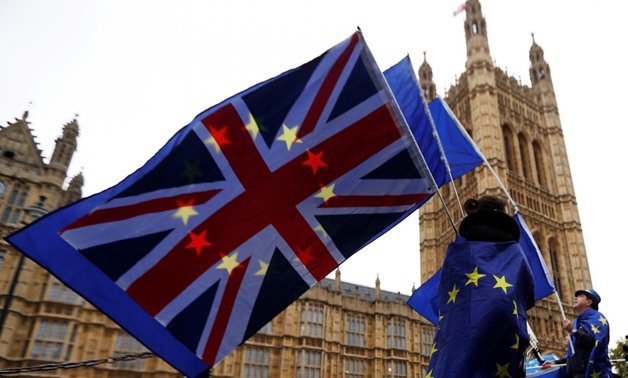
Anti-Brexit protesters wave EU and Union flags outside the Houses of Parliament in London, Britain, November 14, 2017. REUTERS/Peter Nicholls
LONDON - 1 December 2017: Signs of progress in Britain’s negotiations to leave the European Union mean the chance of a disorderly Brexit declined in the past month, a Reuters poll found, and the talks will probably end with a free trade deal.
Potentially heralding a breakthrough in the talks, Britain and the EU have reached agreement on a divorce bill and are close to agreement over the Northern Ireland border, newspapers reported this week.
So the chance of a disorderly Brexit - where no deal has been reached when the two years of talks are scheduled to close in March 2019 - has fallen to 25 percent from the 30 percent chance given in an October poll.
“With the UK ready to honour its full commitments in the Brexit bill, and a good chance that London and Dublin can strike a compromise on the Irish border question soon, we now see a lower risk that the UK and the EU will part company without a future trade deal by the March 2019 Brexit deadline,” said Kallum Pickering at Berenberg.
The talks will probably end with a UK-EU free-trade agreement, an overwhelming majority of economists polled Nov. 27-30 said, as in previous Reuters polls.
“UK negotiators would be guilty of a dereliction of duty if they failed to agree a free-trade agreement - or at least to agree talks about talks,” said Peter Dixon at Commerzbank.
Second most likely outcome, the poll found, was Britain leaving without a deal and instead trading with the continent under basic World Trade Organization rules.
Third was European Economic Area membership, under which Britain would pay to maintain full access to the EU Single Market. The least likely option was a reversal of the decision to leave the EU.
The sample was similar to in recent polls.
INFLATION BITES
Britain has not sunk into recession since the June 2016 decision to leave the EU, as many economists predicted. The median forecast for one in the coming year is just 20 percent, unchanged from a Nov. 17 poll.
But growth will lag the euro zone’s and the economy is forecast to expand just 0.3 to 0.4 percent per quarter through to mid-2019, the poll found [ECILT/EU].
High inflation, driven by a fall in sterling since the referendum, has curtailed the spending power of consumers who played a major role in driving economic growth last year.
Inflation has probably already peaked and is expected to average 2.7 percent this year and 2.5 percent next, the poll found, still well above the Bank of England’s 2 percent target and unchanged from a November poll.
Last month, the Bank added back the 25 basis points it took off borrowing costs in the aftermath of the vote, taking Bank Rate back to 0.50 percent, but it won’t act again until towards the end of 2018 when it will add another 25 basis points, medians showed.
It will add another 25 basis points in 2019, but if no deal is reached with the EU, economists largely said they expected to trim their Bank Rate forecasts.
None of the 68 economists polled expect any change when the Bank announces its policy decision on December 14.
“With inflation close to peaking and growth likely to remain soft in the near term, we expect the Bank of England to wait until Q4 2018 before raising rates again,” said Dominic Bryant at BNP Paribas.


Comments
Leave a Comment